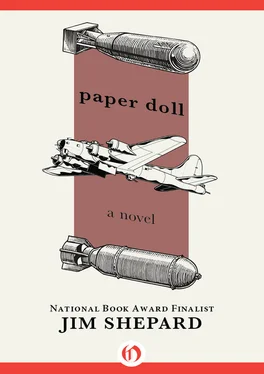Everything is progressing, his uncle had said, more than once. The world was better in every possible way than it was before, and that was something to think about. They had seen the GM Futurama three times, despite the lines and the heat. Bryant had hoarded money his mother had slipped him — his father had suggested to his uncle that they were there to see the exhibits, not to fill up on junk — and he remembered budgeting his time between ice creams more vividly than the exhibits, even the Futurama, with its vast plains and miniature cities explained endlessly by a voice annoyingly like his uncle’s. They had to get ready for the future, his uncle and the voice told him, find their skill, find their place, because the future was where they were going to spend the rest of the lives. It had seemed to him plausible as wisdom until he had thought about it at greater length, at home, and then he had become annoyed at the obviousness of it.
The World’s Fair had frightened him, with its armies of everyone excelling or about to excel, with its talk of a future which seemed so briskly progressive that he’d only be afforded minutes to find and fill his niche and hours to prove himself within it. He had paid close attention to the aviation exhibits, but had absorbed nothing, really, and was wretchedly certain on that long ride back home that he had no aptitude for it, no aptitude for the future, no place in the World of Tomorrow.
The immensity of his presumption, he remembered, had haunted him on that train as it had trundled through Stamford, Bridgeport, New Haven: fly an airplane! Bobby Bryant bringing in the mail through the winter storms of the Sierras; Bobby Bryant barnstorming to beat the band. Could he really take these huge metal machines off the ground and return them as gracefully as falling sheets of paper? His only comfort, when his fears called his dreams to account, was that he didn’t really see how anyone did it.
He’d developed the courage to mention it once, on a family outing his father had granted his mother. His mother had packed sliced celery and fresh pea pods wrapped in foil, wedges of baloney in waxed paper, and his father’s big canteen filled with iced tea, the bags still floating darkly in the cool interior.
They had spread a blanket on a grassy area of Voluntown State Park a short distance into eastern Connecticut, having borrowed his uncle Tom’s Ford for the trip. His mother had spread the food out with some joy and his father poured tea into a collapsible cup already sweating with condensation, and gazed at Amy’s gingham animal as if clearly not recognizing it but feeling that he should. He was ill at ease on the blanket and wore a T-shirt and black pants belted high on his stomach. Bobby drank the tea and rolled the glass on his forehead. His father after eating had wandered off for a look-see and Bryant had followed. He’d caught up to him standing ankle deep in a pond below a rock fall, in shade deep and cool as his grandmother’s sitting room. His father’s pants were rolled to the knees, and his legs sloshed gently back and forth in place. Bryant had slipped off his shoes in the hush and edged in, through a stream sheeting water quietly down a rocky grade, the water cold as bone. His feet were prominent and unreal in the lucidity of the water. Bits of glass blinked sunlight back at him from the bottom. He was about to mention the glass in warning when his father quieted him with a hand motion and pointed. Four fish had glided to a stop just next to his ankle, their tails slowly waving like underwater pennants.
Back at the blanket Bryant had been encouraged enough to bring up someone’s recent round-the-world flight, and his mother had commented politely that it was quite a feat, though his father had remained noncommittal.
“I’m going to be a pilot in the Army Air Corps,” he finally said. His tone struck him as somewhere between forceful and pitiful. He had considered mentioning the RAF but had quailed at the last moment.
His father had seemed preoccupied with a nearby pine. “Isn’t that very dangerous?” his mother asked vaguely.
If talk was money, his father had finally said, brushing those black pants with exaggerated care, he supposed they’d all be millionaires by now.
“We had a game,” Snowberry said, dreamily, “a game we used to play when we were kids. Mel and I. Mel was a year older. He’s in the Navy now, in the Pacific. We were just kids. There was a rope swing with a heavy wooden seat, weathered so that it was that gray color wood gets. We found out if we lay down underneath it, it cleared our noses and faces by just a few inches. And I would lie there and Mel would swing, or Mel would lie there and I would swing, and you’d look up at the clouds and leaves and branches and hear it coming and have to look and it would be by, so fast, so close, you couldn’t believe it, each time. At the top of the swing it was miles away, and then it was back over you, the grain of the wood whooshing by, and you thought, if I lift my head, imagine. And you felt the dirt scuffed floury by all those kids’ feet and the ragged dry grass and the sun and the rush of air from the long swoop of that swing.
“We always went back,” Snowberry said, “even when the ropes were frayed, even when the wood seat split.”
During the next few days they were favored with an unexpected guaranteed shutdown — so much for Stormy’s highs and lows, at least for the time being — and Snowberry had somehow obtained authorization for a base party for the village children. Naturally, the children would need to be accompanied, perhaps by unattached village girls. Knowing it was a squadron tradition, Snowberry had suggested a Christmas party. When reminded that it was nearly August, he let on that he knew, but that they needed cheering up.
They’d been able to contact Jean and Robin on the base phone, a lonely and listing booth near the picket post, and both had agreed to come, their voices reflecting first their hesitancy as to how they were to get there and then their amazement at how quickly things happened with Americans. They were running trucks into the surrounding villages, Bryant explained, so it was really just a matter of being there when the trucks showed up and hopping on board. He suggested, at Piacenti’s urging from behind him in line at the booth, that she bring friends as well.
After the empty trucks had rolled out to cheers and hoots, the squadron gathered for the pre-mission briefing in one of the huts. The men sat and squatted in rows. Snowberry had pinned a blanket up on the board and had tied rope running away from it in a parody of the red mission yarn and mission board. The rope ran off the board, down the floor, and partially up another wall. Lewis, as the CO, told them with exaggerated sobriety that they had a long one today, and then swayed a bit, slopping something out of a sawed-off can. It spattered on his shoes to much applause. Snowberry played the intelligence officer, and he unveiled maps of a dance floor and the female body. He diagramed the mission route to whoops and concerted foot stamping, and outlined the expected resistance. There would be losses, he assured them. He wasn’t going to stand up there and lie. But some of the men would get through.
The men roared. Eddy, who had been drinking since the announcement of guaranteed stand-down, curled forward out of his chair with a crash, and passed out.
“What about flak?” someone called.
The flak was supposed to be very heavy, Snowberry told them. The clap was supposed to be light.
“Remember, men, when you’re protecting yourself, you’re protecting your country,” Lewis said. He slurped from his can.
Snowberry was waiting for attention. “You gunners,” he was saying. “We need to stress again our desire for accuracy and efficiency.” With a flourish he pulled a canvas from the blackboard and revealed a large male organ he’d painstakingly drawn in chalk. Bean cupped his forehead with his hand and Bryant couldn’t help laughing. “Now, to illustrate,” Snowberry said, “I’ve diagramed my own situation, much reduced in scale, of course …”
Читать дальше












